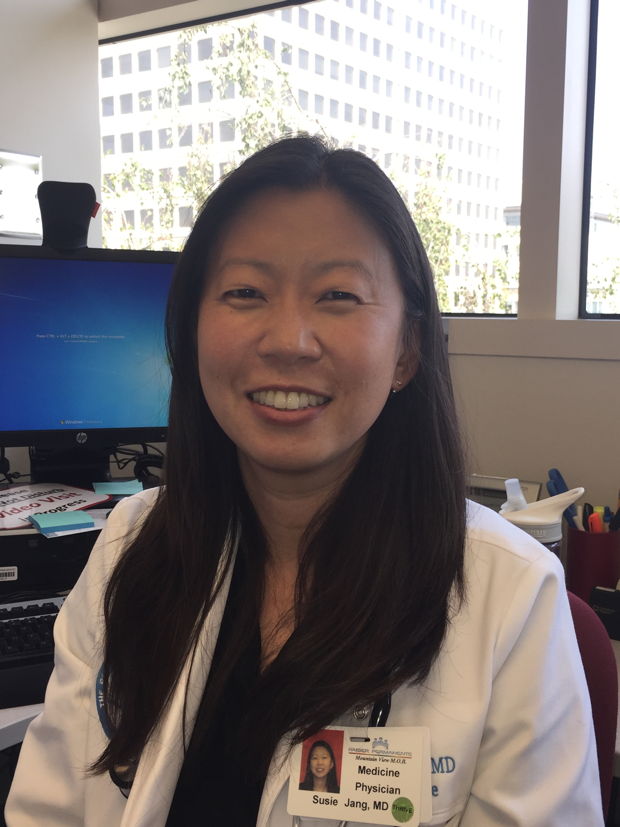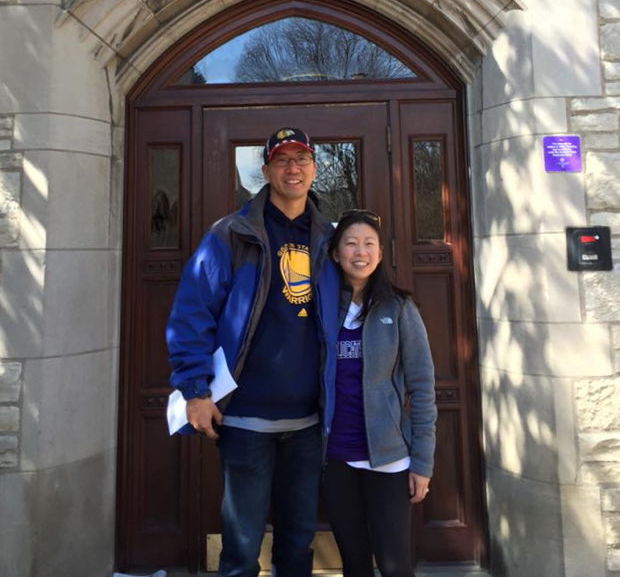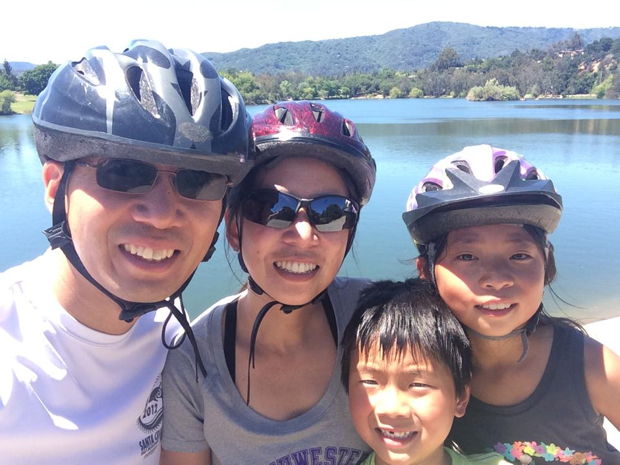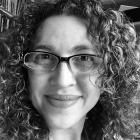
Hi Susie, it’s so good to talk to you! Tell us a little bit about yourself — your family, your work, and where you live.
I’m a physician, and I’ve been practicing internal medicine for the past 14 years. I am part of a group practice and have been working part-time since my second child was born. I’ve been married for 17 years to my husband Jim, also a physician, and we have two beautiful children, ages 12 and 8. We live in Sunnyvale, California, which is in the heart of Silicon Valley in the Bay area.
Even though we’ve known each other for a long time, I’ve never asked you — how did you decide to go into medicine? What drew you to it? And I’m really interested to hear how God has been at work in your sense of calling.
Well, my mother was a nurse, so I was exposed to the health care field at an early age. My father used to take us regularly to the hospital where she worked so we could eat dinner together while she was on a break.
What a great idea! I love that image of your family coming together to support your mom in her calling while also thinking creatively about how to deepen your own family bonds.
Yes, I think it had a big impact on me. I have always felt a need to serve or be helpful in some way, and I’ve known that my vocation would be service-related. I became a Christian in my junior year of high school which coincided with the time when I was starting to think about college applications. It made sense to me to pursue medicine — Jesus was a healer, so what better way to follow Jesus than by becoming a physician?
Tell me a little bit about your practice. What do you enjoy about your work? What is challenging?
My practice has given me the unique opportunity to meet people that I probably would not have pursued a relationship with outside my professional life. My patient population age varies from 18 to over 100 and my patients come from all different ethnic and socioeconomic backgrounds and lots of different religious beliefs. I feel really blessed to be able to listen to their life stories — to be able to hear about their fears and joys and concerns and worries.
My patients often share things with me that no one else knows about them — and I do not take that lightly. People carry such heavy burdens and I think it helps to just be able to sit and talk to someone about them. I have had people come in on the day of a spouse’s death just to talk and grieve and decompress. I have had adult children come in to ask me about how to talk to their parents about their sexual orientation. I do not think I always have the “right” answer, but my patients trust that I will listen and give objective feedback.
How has God grown you through your work?
Sometimes I feel like God has used my patients to bless me more than he has used me to help them! I have learned so much about grace and dignity and perseverance by watching what some of my patients have to endure on a daily basis. God has used them to broaden my point of view and he has challenged me to serve them faithfully no matter what the circumstances. I may not always approve or agree with their lifestyle choices, but my job is to give them my best medical advice. Even though people may have very different belief systems than I do, I have to communicate with empathy and compassion. They cannot teach this in a medical school classroom or in a textbook. This is the art of medicine. It is learned with lots of practice — and failures! Jesus was a great example of this. He treated everyone — Pharisees, adulterers, tax collectors, everyone — all equally. It is one of my goals to emulate this in my own medical practice.
You said that you’ve been practicing for 14 years. How has your work changed over time?
The electronic medical record has definitely changed the way medicine is practiced. On the one hand, it is efficient and it can be shared amongst health care providers quickly. On the other hand, it can get in the way of the patient-doctor relationship since, unfortunately, I spend time during the visit typing and looking at a screen. Some medical practices have hired scribes just so physicians can avoid this and focus on the patient. Lately, it seems that efficiency and patient satisfaction survey scores take precedence over building a relationship with the patient. Over the years, it seems that medicine has become more of a business rather than a profession. But I aim to keep my interactions with patients as personal as I can. I try to pray daily on the drive into the office for Jesus to use me and guide me as I take care of my patients — and I try not to worry about the business aspect of it all.

You and Jim were quite young when you got married, right? And I seem to remember that you were both in med school at the same time. How did you get through that time with a healthy marriage? How did you support one another?
Jim and I married right before medical school graduation — we were 26 and 25. And yes, we were in the same medical school class at Northwestern and were residents in Internal Medicine at the same time. We never did a medical school clinical rotation together and we trained at different institutions for residency — which I think was a good thing. Direct competition like that would probably have damaged our relationship! We tried to avoid being on call at the same time so that at least one of us was “fresh” while the other was recovering from a night at the hospital. It was so helpful to know that if I was post-call he would be the one to take care of laundry, dinner, and things like that so I could sleep — and vice versa. We were — and still are, to a more limited extent — each other’s sounding boards for difficult cases and stressful situations at the workplace. And we tried to have fun during our spare time — we took hikes in beautiful places, spent time with good friends, sometimes went to a movie. We have fewer opportunities like that now that we have children, but we still try to make time for just us. Someday the kids will be out of the house, and it will just be the two of us again, so I know it is important to try to stay connected.
Can you tell us about your transition from med school to residency to practice?
Each transition comes with its own set of challenges. During medical school, you learn a vast amount of knowledge and shadow physicians for the final two years of school. In theory, this should prepare you for residency but I do not think anything could really prepare one for the hectic and rigorous lifestyle that all residents endure. I am glad that I was young when I went through it, because I know I certainly could not survive it as a middle-aged woman! During residency, I clung to the fact that I knew only Jesus is perfect and in control. I often felt helpless in the midst of caring for critically-ill patients and fretted over all the decisions I had to make in their care. Sometimes the responsibility of overseeing life and death situations in the hospital was overwhelming. But I tried to remind myself that it was God who was truly in control. It eased my burden a little knowing that he already knew the outcome of every situation and decision I was involved in.

You have two pretty amazing children, and I know you are really invested in their lives. How has having children affected your work and life?
Children change everything! Life balance is always tricky, but with children it becomes even more complicated. When I am at the office, I lament that I am not the one taking care of my children. We have a wonderful nanny and my parents help as well — it really does take a village to raise little ones! When we only had one child, she was in daycare five days each week, since I was still working full-time, and I struggled with a lot of guilt. I would try to rush out of the office at the end of the day so she would not be the last child to be picked up at daycare, but there were days where this was the case due to a sick patient or sensitive conversation that could not wait.
I am now working part-time, but since the kids are older with more after school activities, I still need quite a bit of help. We have a nanny who picks up the kids from school several days per week and my parents fill in as needed. I would love to be the one picking them up every day and shuttling them around, but it is just not practical. And even when I am with them, I often find myself being distracted and mulling over a difficult case instead of being truly present with the kids. Just the other day my son was trying to tell me about his day, but I was too busy poring over e-mail messages from patients on my laptop to be truly attentive. And there are days when patients express disappointment because I am unavailable to see them. They do not want to know that I am volunteering at my daughter’s classroom party or my son’s school field trip. They are hurting and concerned and they want me available for them. I have learned that being a working mother means to constantly feel conflicted and divided.
And yet, I still feel called to both motherhood and medicine. Being a mother has definitely made me a better physician. Mothers become experts at multi-tasking, which helps in everything! I have more patience than I did before having children. I would also like to think I am more compassionate and understanding since becoming a mother. And I would like to think that being a physician has, in turn, helped me to be a better mother. In medicine, I have to be efficient and prioritize and recognize urgent issues on a daily basis. This has benefited our parenting by helping my husband and me to prioritize the things that we feel are important: developing our kids’ spiritual lives, education, and striving for excellence in whatever they pursue.
As an Asian-American woman, how has your gender and ethnicity influenced your experience as a physician? Specifically, do you think it has impacted the way you have been treated throughout your journey? Has it influenced your practice?
I have read and heard stories of physicians being treated differently — in a negative sense — due to being Asian-American. God must be shielding and protecting me because I can honestly say that I have never felt that I was being treated differently by staff or patients because I’m Asian-American. And I mean starting from medical school through residency and into my years in practice as an attending. Perhaps it has helped that I have only studied or practiced in major metro areas — Chicago, New York, San Francisco Bay area. I feel quite fortunate that this has been my experience.
However, I do feel that I have been treated differently at times as a woman. I recall feeling out of place during my Orthopedic Surgery rotation during medical school, being at conferences where I was one of maybe two or three females in a room of over 100 men. I remember attendings yelling at me and at other female residents for perceived errors but then treating male residents with more respect. These experiences just remind me that like Jesus, we have to treat everyone with respect. Whether they are rich or poor, educated or not, Jesus doesn’t show partiality — and we should follow his example!
As a practicing physician along in your career, what would you want to say to Christian med students and residents?
It is really important to find a Christian community no matter what stage of training one is in. Everyone needs someone to share with and someone to pray for you and keep you accountable. Residency is a particularly stressful time and is challenging physically, emotionally, and spiritually. I am so grateful for the women who were in my church small group Bible study during that time in my life. They kept me grounded and sane. They could not always relate or fully understand what I was grappling with, but they could listen and offer encouragement and pray. I would ask them to pray for strength and energy especially if I was on a tough rotation like the ICU or Emergency Department and just knowing that a group of people were praying for me helped to buoy my spirits.
But if I were to give some advice, I’d say this: Do not let school or training or work take precedence over your Christian faith. I have seen fellow Christians isolate themselves during medical school or residency and end up falling away from Jesus. I know that the path to becoming a physician can be all-consuming, but if you are distant from the Lord, then it is all for nothing. Become an active member of a local church, join a Bible study, find other believers to share your life with. Remain in the body of believers — it is the best way to grow your faith and to prevent burnout.
Thanks so much, Susie!






